
What is pancreatic cancer and the types
Pancreatic cancer develops when cells in the Pancreas begin to grow uncontrollably, forming a tumour.
There are two main groups of pancreatic cancer:
- Exocrine tumours (most common) — these start in cells that produce digestive enzymes/ducts. For example, the most frequent type is Pancreatic ductal adenocarcinoma (PDAC).
- Neuroendocrine tumours (NETs/pNETs) — less common, start in hormone-producing (neuroendocrine) cells in the pancreas.
Statistics in the UK & common causes
Here are some key UK-figures:
- Around 10,800 new cases of pancreatic cancer each year in the UK (2017-2019).
- It is the 10th most common cancer in the UK, making up about 3% of new cancer cases.
- Each year around 10,100 deaths from pancreatic cancer in the UK — roughly 28 people every day (2021-2023).
- Survival rates are low: only around 4.3% of people diagnosed are expected to survive 10 or more years.
Common risk and cause factors include:
- Smoking
- Type 2 diabetes and chronic pancreatitis (inflammation of the pancreas)
- Older age (most cases diagnosed in people aged 70+).
- Obesity, heavy alcohol use, family history/genetic factors.
- There is also a clear relationship with deprivation and higher incidence in more deprived areas.
Long-Term Effects
A diagnosis of pancreatic cancer — and its treatment — can lead to ongoing impacts:
- Digestive and nutritional challenges: because the pancreas is central to digestion and hormone regulation, patients may struggle with enzyme production, weight loss, appetite issues and fatigue.
- Physical effects of treatment: surgery (sometimes substantial), chemotherapy and radiotherapy can cause long-lasting fatigue, pain, reduced mobility and may limit daily activities.
- Emotional and psychological impact: coping with a serious diagnosis, changes to lifestyle, uncertainty about the future and the need for more frequent medical checks or follow-up care.
- Impact on daily living and home life: because of physical or nutritional limitations, clients may need more assistance with personal care, mobility, meal preparation, managing medications and home adaptations to maintain safety and independence.
- For families and carers: ongoing support needs, changes in roles, potential for carer fatigue and increased need for coordination of services and home–health care interface.
How TrustBridge Care can help
At TrustBridge Care, we understand the journey that individuals facing pancreatic cancer and their families, go through. Here’s how we support those needs at home:
- Tailored domiciliary care: We provide support that changes with the individual’s needs — whether it’s helping with personal care, assisting mobility, supporting meal preparation, or ensuring safe home environments.
- Nutritional and digestive support: With the pancreas’ role in digestion, we coordinate with dietitians and healthcare providers to support clients who may need help with enzyme therapy, special diets, or monitoring nutrition.
- Coordination with health professionals: We liaise with oncology, specialist nurses, district nursing teams, and other professionals to ensure continuity of care, timely referrals and that changing needs are responded to promptly.
- Emotional and social support: We recognise that it’s not just physical care — our carers offer empathy, companionship, and help keep clients connected with their support networks, hobbies and meaningful activities.
- Support for families and informal carers: We understand the pressure carers face — we offer respite, reliable scheduling, communication and flexibility so that family carers also get the support they need.
- Promoting dignity and independence at home: Many people prefer to stay in their own homes rather than move into institutional settings. We help make that possible by delivering compassionate, respectful care in familiar surroundings.
Closing Thoughts
Pancreatic cancer is one of the most challenging cancers — both because of how it presents and how it affects the lives of those diagnosed. But awareness matters: by understanding what it is, knowing the risks and the long-term effects, we can be better at supporting individuals and their families.
At TrustBridge Care, we’re committed to standing alongside you — providing not just care, but partnership, respect and compassion every step of the way. If you or someone you care for is living with pancreatic cancer, or recovering from treatment, please reach out. We’re here to help.
Thank you for reading and for being part of a community where care, understanding and dignity are at the heart of everything we do.